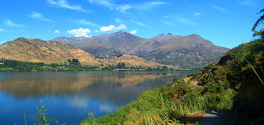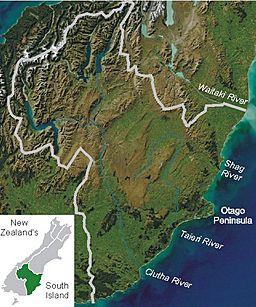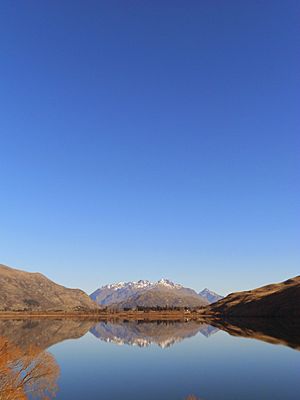Lake Hayes facts for kids
Quick facts for kids Lake Hayes |
|
|---|---|
| Te Whakaata a Hakitekura | |

Lake Hayes from the Queenstown Trail
|
|
| Location | Central Otago, South Island |
| Coordinates | 44°59′S 168°48′E / 44.983°S 168.800°E |
| Lake type | Glacial lake |
| Native name | Te Whakaata a Hakitekura (Māori) |
| Primary inflows | Mill Creek |
| Primary outflows | Hayes Creek |
| Catchment area | 44 km2 (17 sq mi) |
| Basin countries | New Zealand |
| Surface area | 2.76 km2 (1.07 sq mi) |
| Max. depth | 33 m (108 ft) |
| Surface elevation | 315 m (1,033 ft) |
Lake Hayes is a beautiful small lake located in the Wakatipu Basin, part of Central Otago in New Zealand's South Island. It's found near the popular towns of Arrowtown and Queenstown.
The southern part of the lake is close to State Highway 6. On its western side, you'll see Slope Hill. The best place to access the lake for fun activities is the northern end, which has a big grassy area.
The Lake Hayes Showgrounds, with its pavilion and parking, hosts an exciting annual event called The Lake Hayes A&P Show. Right across the main highway, you'll find a large neighborhood called Lake Hayes Estate, which is named after the lake.
A special path called the Lake Hayes Circuit goes all the way around the lake. This path is part of The Queenstown Trail and is very popular for walkers, runners, and cyclists.
Discovering Lake Hayes' Past
The local Māori iwi (tribe) of Ngāi Tahu originally named this lake Te Whaka-ata. Another name was Te Whaka-ata a Haki-te-kura. This name came from an ancestress named Haki-te-kura, whose reflection was said to appear in the lake's clear waters.
Early settlers first called the lake Hays Lake. This was after D. Hay, an Australian who came looking for sheep farming land in 1859. Over time, its name slowly changed to Lake Hayes. This happened because people mistakenly thought Captain "Bully" Hayes, a well-known local person, had discovered it.
Animals You Might See at Lake Hayes
Many different birds live on or near Lake Hayes. You might spot introduced birds like the mallard duck and feral goose. Native New Zealand birds include the New Zealand scaup, the elegant Australasian crested grebe, and the black shag.
If you enjoy fishing, you can find some interesting fish in the lake. These include introduced species like brown trout and perch. There are also native New Zealand fish such as the upland bully, koaro, and the long-finned eel.
 | Jackie Robinson |
 | Jack Johnson |
 | Althea Gibson |
 | Arthur Ashe |
 | Muhammad Ali |



